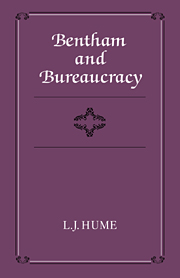Book contents
- Frontmatter
- Contents
- Preface
- Acknowledgements
- List of Abbreviations
- 1 Introduction
- 2 Government in eighteenth-century thought
- 3 The foundations of Bentham's thought: the Comment, the Fragment, the Introduction and Of Laws in General
- 4 Further explorations in jurisprudence
- 5 From principles to practice: the Panopticon and its companions
- 6 From the Panopticon to the Constitutional Code
- 7 The Constitutional Code and Bentham's theory of government
- 8 Conclusion
- Notes
- Bibliography
- Index
- Cambridge Studies in the History and Theory of Politics
7 - The Constitutional Code and Bentham's theory of government
Published online by Cambridge University Press: 18 November 2009
- Frontmatter
- Contents
- Preface
- Acknowledgements
- List of Abbreviations
- 1 Introduction
- 2 Government in eighteenth-century thought
- 3 The foundations of Bentham's thought: the Comment, the Fragment, the Introduction and Of Laws in General
- 4 Further explorations in jurisprudence
- 5 From principles to practice: the Panopticon and its companions
- 6 From the Panopticon to the Constitutional Code
- 7 The Constitutional Code and Bentham's theory of government
- 8 Conclusion
- Notes
- Bibliography
- Index
- Cambridge Studies in the History and Theory of Politics
Summary
The source of Bentham's decision to begin drafting the Constitutional Code lay in the set of circumstances that prompted him to write ‘First Lines’, the Codification Proposal and ‘Rid Yourselves of Ultramaria’. The political changes and the prospects of change in Spain, Portugal, Latin America, Norway and the Mediterranean encouraged him to believe that he would soon receive a commission to draft an all-comprehensive code or a substantial component of one. His hopes were at first centred on Spain. The revival of constitutional government in that country in 1820, and his first contacts with members of the constitutional regime and with liberal publicists (notably Mora), led him confidently to expect an official invitation to compose either a complete code or a penal code. When the Spaniards disappointed him, first by asking him only to work on his Paper Money proposal and then by succumbing to counter-revolution, he turned his attention to Portugal, from whose Cortes he did receive a commission in April 1822. He began working on the Constitutional Code at about that time.
Although the Constitutional Code was the only part of his practical work on codification that was published, he never thought of it as a self-contained project and he never intended to delay starting on the other parts of the all-comprehensive code until this was completed. On the contrary, while he was working on constitutional law he started to draft some of the other parts and made fairly rapid progress with them, especially the Penal and Procedure codes.
- Type
- Chapter
- Information
- Bentham and Bureaucracy , pp. 209 - 237Publisher: Cambridge University PressPrint publication year: 1981
- 1
- Cited by

